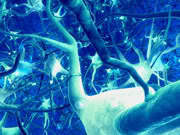 Everyday we “recreate” ourselves and our lives using the same patterns over and over. Even those of us who want to change things, whether it’s ourselves or our external world, will repeat the same behaviors.
Everyday we “recreate” ourselves and our lives using the same patterns over and over. Even those of us who want to change things, whether it’s ourselves or our external world, will repeat the same behaviors.
If you’ve ever made an intention or decision to change something about yourself or your life and found you ended up right back where you started, then you understand what I’m talking about.
Our brains are hardwired to create pathways that promote habitual behavior.
 Once that pathway is “set”, our basal ganglia either runs a “go” message pathway or a “stop” message pathway. Unfortunately for those of us trying to change a behavior, if we have a habit of behaving in a certain manner, the “go” pathway will set off before the “stop” pathway……even when we don’t want it to!
Once that pathway is “set”, our basal ganglia either runs a “go” message pathway or a “stop” message pathway. Unfortunately for those of us trying to change a behavior, if we have a habit of behaving in a certain manner, the “go” pathway will set off before the “stop” pathway……even when we don’t want it to!
And on top of all that, once the habit is formed, you’re then predisposed to act in ways similar to the original habit. For instance, if you want to lose weight but you have a weakness toward deserts, you’re more likely to substitute any kind of sugar if you give up the deserts.
AND if you get rid of any and all things that are “sweet”, like throwing out all processed sugars or fruits, you’ll be setting yourself up for failure. Going all out “cold turkey” doesn’t usually work! It’s almost as if our subconscious mind goes into an immediate panic mode when we tell it “you cannot have anything!”.
What can you do?
One way you can start creating a new pathway of behavior is by replacing an unwanted behavior with a desired similar one. Telling yourself not to think about something or that you’re not going to do it only keeps the unwanted behavior in the forefront of your mind. Instead, you want to divert the behavior into a different one.
Examples:
If you’re trying to stay away from deserts, you can replace typical desserts like cake, pies, ice cream, any baked goods, etc. with a healthier option like fruit without whipped cream or toppings.
If you find your issue with weight loss is constantly snacking all day: instead of reaching for the regular foods you consume, chew on sugar free gum.
Or maybe you have a habit of quickly getting mad at someone and then saying something you end up regretting. Instead of trying to stop yourself from getting angry, see if you can catch the beginnings of it and first say “Stop” internally, then consciously take 3 deep breaths and say “Relax” with each exhale. Eventually, this will become the habit rather than the verbal response. (It would also be beneficial to deal with the underlying cause of the anger at some point)
Whatever your “bad” habit of choice is, think of something you can replace it with. Plan it out and set it up…..leaving things to chance is a sure fire way to go right back to the old behavior.
You can use your brain to help you change an unwanted behavior. The brain doesn’t know the difference between something real or a memory of something. If you spend a couple of minutes each morning and evening imagining yourself behaving the way you desire, after awhile you will have created a new pathway of that behavior which will compete with the old unwanted one.
If you start behaving in the unwanted pattern, just turn your brain to the “imagined” behavior.
White knuckling it doesn’t really work. We’ve spent a long time creating the unwanted behaviors and it can take awhile to replace them with new desired behaviors.
It’s said that there is a battle for cortical space in our brains so if you don’t keep up the practice until the new pathway is formed you’ll lose it. This is why it takes at least 28 days to start seeing automatic results.
So decide on a plan of action, set it up for optimal results, turn your mind to the desired result and keep it up for at least 28 days.
If you find you need help breaking unwanted patterns of behavior or want more information check out:
http://www.neuralpathwayrestructuring.com
Resources:
http://news.mit.edu/2005/habit
Pathway-Specific Striatal Substrates for Habitual Behavior. Neuron, Published Online January 21 2016.



